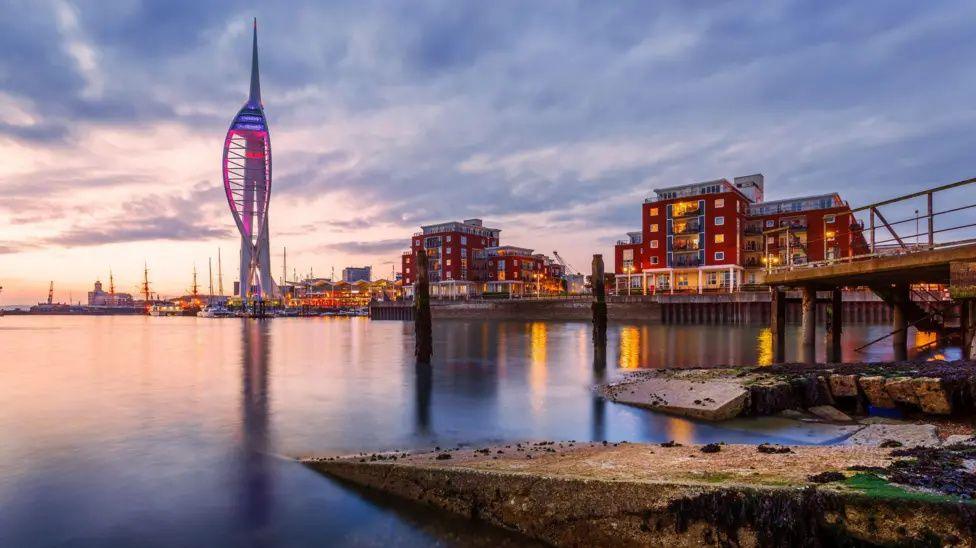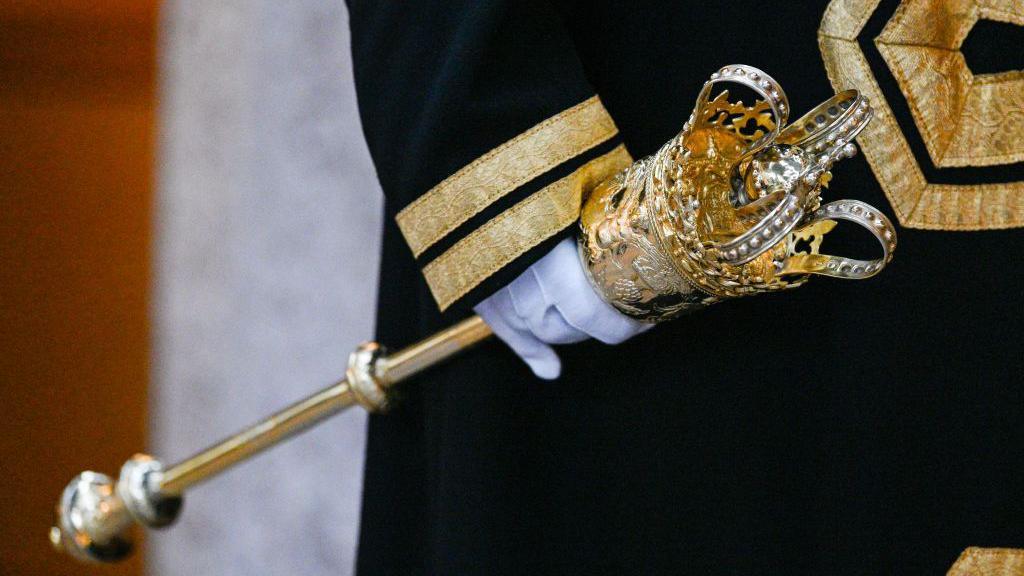Devolution: What is happening where I live?

Portsmouth City Council was one of four authorities to put in a "Hampshire and the Solent" devolution bid
- Published
Five councils in Hampshire and Dorset have submitted applications this week asking to be part of a devolution deal.
But what does it mean for the people who live in the area?
What is devolution?
It is the biggest change to local government in a generation.
It would see the creation of a new super authority that takes power and money from Westminster.
Alongside the combined authority, there is normally an elected mayor.
With local council leaders, they would make decisions about how to spend a pot of money in a regional area.
Greater working together across boundaries works best in areas including transport, skills and employment support, housing and planning and tackling climate change, the government has said.
Supporters say it will bring more money and power to local areas but the idea of an elected mayor is less popular with some.
How would the South be split?
Hampshire County Council, Southampton, Portsmouth and the Isle of Wight have put in a "Hampshire and the Solent" devolution bid.
And Dorset Council has teamed up with Wiltshire and Somerset for a "Heart of Wessex" plan.
BCP (Bournemouth, Christchurch and Poole) is not currently included in either but has a meeting on Wednesday to decide which it could join, or whether to fight to have its own mayor.
The leader of BCP Millie Earl said: "Our travel to work and wider economic area includes parts of the Dorset council area and parts of Hampshire, neither deal really works for us."
Will it mean more bureaucracy?
The council leaders in Hampshire say no, it would mean less.
The new combined authority would have its own staff but the new mayor would replace the current Police and Crime Commissioner.
Lorna Fielker, leader of Southampton city council, said councils currently have to go "cap in hand" to government asking for pots of money for projects.
She added the process is time consuming and can be exasperating, because "pet projects" of the government get funding, not what local areas need.
But Ed Blake, Conservative opposition councillor on Isle of Wight Council, said there was uncertainty over the role of mayor.
"We don't know yet what powers this person will have, and we don't want someone from the mainland having control over Island planning, for example," he said.
Are elections being cancelled?
Alongside the devolution bids, some councils have asked to postpone the local elections planned for May.
Nick Adams-King, leader of Hampshire County Council, said: "There isn't the time to run elections, form a new council and create the new authority in the timescale required."
This is controversial with some councillors, who believe their leaders would not have a mandate to agree to a devolution deal.
The Ministry for Housing, Communities and Local Government said there was no requirement to postpone elections but it would consider requests where it helps an area deliver devolution.
Will someone new empty my bins?
Not straight away, in day-to-day life you probably would not notice much difference initially.
The council leaders hope the longer term impacts are better public transport, a move to net zero and economic growth, so more jobs.
But to answer the question about bins, it might change eventually, depending where you live.
In the white paper about devolution, the Labour government also wants local government reorganisation.
That means getting rid of two-tier local government, scrapping district and borough councils and creating unitary authorities with populations of at least 500,000 people.
This already happened in Dorset in 2019.
In Hampshire, it would mean the end of 11 authorities, including Test Valley Borough Council, New Forest district and Eastleigh Borough.
Leader of Gosport Borough Council Peter Chegwyn said he was concerned about the loss of this level of government.
"This is a dangerous step, against the whole idea of devolution, moving power nearer to those who live and know the area," he said.
"Decisions could be made about what happens in Gosport by people who are miles away elsewhere in Hampshire and don't know the area at all."
If local government reorganisation happens, the authority you pay your council tax to will change, and so will the provider of all your public services.
When does all this happen?
The government will let authorities know if they are on the devolution priority programme by the end of January.
A public consultation would follow.
If deals are agreed, the new mayor could be elected in May 2026.
There is no timetable yet for local government reorganisation but councils are expecting more information in the next few weeks.
Get in touch
Do you have a story BBC Hampshire & Isle of Wight should cover?
You can follow BBC Hampshire & Isle of Wight on Facebook, external, X (Twitter), external, or Instagram, external.
Related topics
Related internet links
- Published10 January
